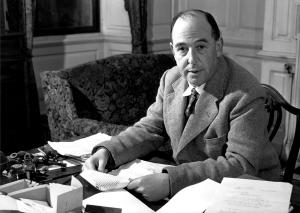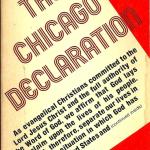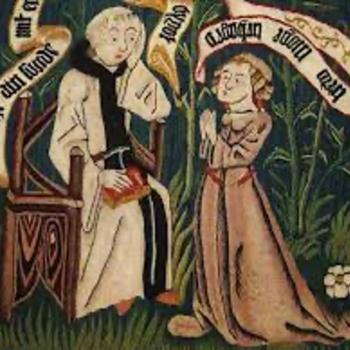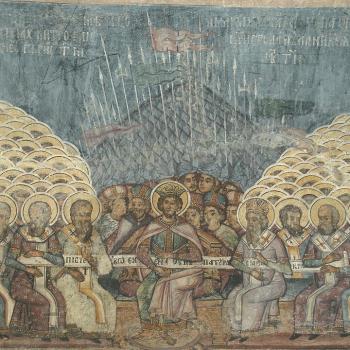As I walked through the book room at the Society of Biblical Literature conference this weekend, I drooled over the vast array of books. Tables after tables of history, theology, exegesis—a nerd’s dream. In order to guide the viewer through this massive surplus of literature, most publishers have broken these works into categories: biblical studies, systematic theology, church history, etc. This phenomenon, of course, is not unique to publishers, but is also seen in the formation of the modern university and many ministries. Even my job title, ‘historical theologian’, tells others what subfield of divinity I research and teach in. All of this is good and helpful in many ways, but we need to acknowledge something important: these distinctions are completely foreign to our brothers and sisters from the Christian past.
Missing the Forest for the Trees
The panel that I presented on was focused on rethinking early Christian polemics, theological debates between two early theologians. Now, many of these explicitly polemical works are downright mean—they vilify their opponents through name-calling, often misrepresenting their opponents’ views for the sake of winning the argument. For instance, I discussed Gregory of Nyssa’s engagement with Apollinarius of Laodicea, which is foremost seen in two direct refutations in the mid 380s and early 390s (Refutation of the Views of Apollinarius and To Theophilus, Against the Apollinarians). Gregory is so vicious in this work that an early 20th century scholar, Charles E. Raven, claims that Gregory is “noisy and self-satisfied, pettifogging and vulgar” in these works (Raven, Apollinarianism, 262). *As an aside, we need to bring the word ‘pettifogging back into regular conversation. But, I digress.* The aim of the panel was to identify if this typically rough engagement was nuanced in any way by looking at other works, particularly their writings, sermons, or (as seen in my paper), their philosophical treaties.
While I won’t dive into the details of my argument here, as it’s long and involves many quotes in Greek, I will share one of the overarching conclusions that I discussed. By chopping up an ancient writers’ work into our modern genres (theology, spirituality, apologetics, philosophy), their theological framework can become skewed or truncated. In my main area of study (Trinitarianism and Christology in the early church), certain types of works are emphasized: theological treatises and polemical works. Why is this? Simply, they discuss these topics most directly—it makes sense to use explicitly theological works to understand someone’s theology. But this reveals a base assumption about how we think about theology (or any of our other disciplines). It seems that we sometimes think theology only happens in certain genres, at the exclusion of others—such as liturgy, sermons, biblical commentaries, or poetry.
Someone like Gregory of Nyssa does not think this way though. In fact, theological tractates are only one of the many genres that he used to build up an understanding of God. Gregory utilizes a striking number of other genres across his corpus: sermons, biblical commentaries, philosophical works, spiritual or mystical works, letters, hagiographies, catechetical lectures, and works in a classical style. Each one of these works is relevant to Gregory in the construction of his own theological system. In my paper, for instance, I discuss Gregory’s On the Soul and the Resurrection. This work is written in the style of Plato’s Phaedo, in which Macrina teaches Gregory how to think about the soul and the afterlife on her deathbed. Gregory uses this philosophical style to convey striking theological points about the composition of a human being, what is proper to the soul, and how we exist in the resurrected state. If we gloss over this work as merely ‘philosophical’, we miss out on its dynamic place in his theological framework. If we only focus on one genre, we miss the ‘theological’ forest for the ‘field specific’ trees.
Planting the Forest: Different Trees for Different Purposes
If different genres might be utilized for developing theological points, we might dwell on the strengths of specific styles for conveying certain truths: specific genres are able to instruct and convey theology in unique ways. A tractate on the Trinity might best describe and define intellectual concepts about the Godhead, but liturgy or prayers might better guide us into the mystery of God’s divine life. Biblical commentaries might show us the nuance of the original text, but sermons demonstrate the links of God’s word to your own lives and contexts. If we stick with one genre, we can be tempted to reduce theology—that is the study of God—to one of these genres: the trinity is just a conversation about how a being can be three in one, or exegesis is solely about the biblical writer’s original context. Reading across genres allows us to see and experience God in unique ways—different trees convey unique (but related) truths.
We might also consider not only what we read, but what we write and create: how we should be planting our own forests. Which trees are we planting, in our understanding of God? Are we creating a forest or a tree farm with a monoculture? Someone who might be a great example in resisting the urge to use one genre alone is C.S. Lewis, who wrote Christian works across many genres. Lewis did not intend his theological vision to begin and end in Mere Christianity—he conveyed truths in God on the Dock, The Silver Chair, Til We Have Faces. In The Lion, the Witch and the Wardrobe, for instance, Lewis sought to show the depths of God’s sacrificial love, which is not as easily conveyed in a philosophical work on the atonement. If we take any lessons from Lewis, we might consider how some genres are better mediums to experiencing and understanding God. The recent work of Jessica Hooten Wilson, Reading for the Love of God, is a great starting place for anyone seeking practical guidance on how to do this well.
All of this is to say, that we need to read broadly across genres in each thinker’s corpus, if we are to arrive at a fuller picture of their ideas. Further, we need to consider employing unique genres in our own writings on the quest for truth. Should we be writing liturgies when we write a theological work? Should we be composing fiction alongside our historical research? Gregory of Nyssa and C.S. Lewis would likely argue: yes. Plant diversely and plant deeply.














